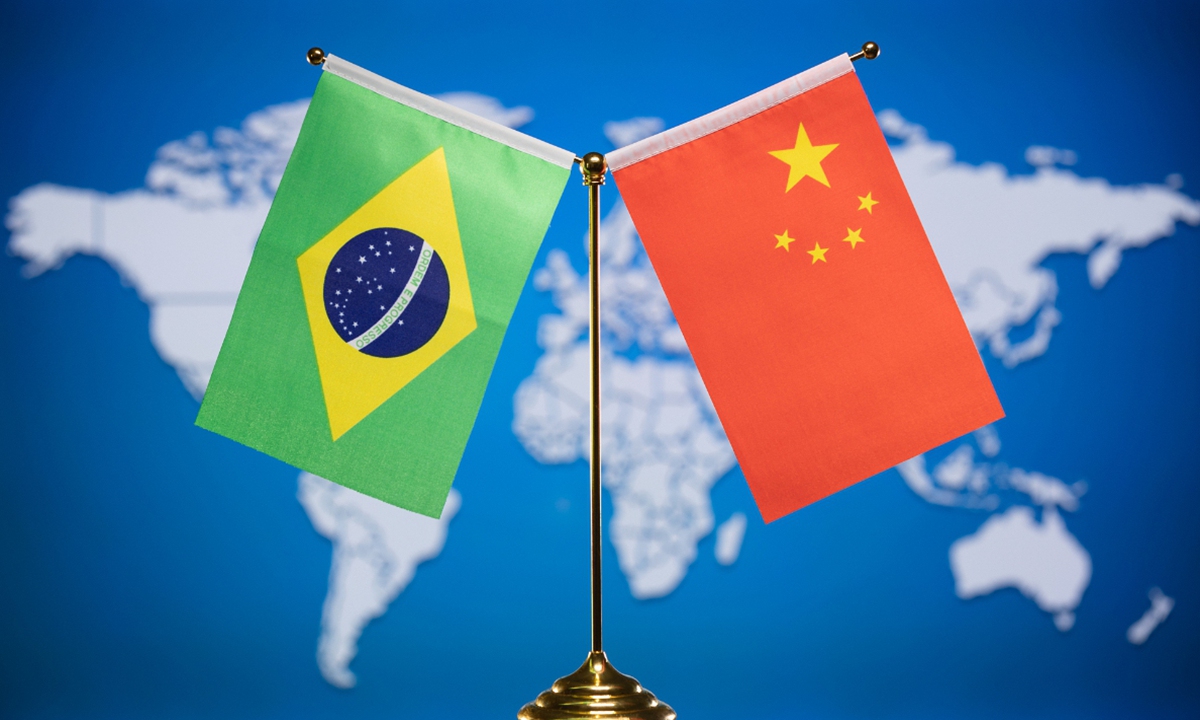
China Brazil Photo:VCG
Thursday marked the 50th anniversary of diplomatic relations between China and Brazil. On this day, Chinese President Xi Jinping and Brazilian President Luiz Inacio Lula da Silva exchanged congratulatory messages, which embodies the importance both countries attach to their relationship. As two large developing countries in Eastern and Western Hemispheres and significant emerging markets, the future cooperation between China and Brazil extends beyond bilateral matters. As President Xi noted, the relationship between the two countries has maintained stable development, with increasingly prominent, comprehensive and strategic global influence. While promoting the development and revitalization of their respective nations, China and Brazil have also played significant roles in contributing to world peace, stability, and prosperity, he added.
Under the strategic guidance of head-of-state diplomacy, China and Brazil have successfully established a model of South-South cooperation. In 2014, President Xi first proposed the initiative to build a China-LAC community with a shared future during the China-Latin American and Caribbean (LAC) Countries Leaders' Meeting in Brasilia. Over the past decade, both China-Brazil and China-LAC relations have been significantly enhanced.
We can see how these two developing countries, separated by approximately 18,800 kilometers, have deepened cooperation in various fields such as trade, finance, food security, climate change, and space cooperation through equality and mutual benefits, steadily moving toward a community with a shared future.
In 2009, China became Brazil's largest trading partner, a position it has maintained for 15 consecutive years. Brazil was the first Latin American country to hit a trading volume of over $100 billion with China. In 2023, Brazil's exports to China reached $104 billion, surpassing the total of its exports to the US and the EU combined. Brazil's soybeans, corn, crude oil, iron ore, and meat continuously enter the Chinese market, while Chinese machinery, such as harvesters, tractors, and drones for pesticide spraying, help Brazil advance its agricultural modernization.
The China-Brazil Earth Resources Satellite project, regarded as a "milestone in South-South cooperation in high technology," serves as an example for breaking the technological monopoly of developed countries and has significantly boosted the confidence of "Global South" countries in their self-reliance and strength.
Meanwhile, the two countries maintain close cooperation within international organizations and multilateral mechanisms such as the UN, the World Trade Organization, the G20, and the BRICS, amplifying the voices for peace and development. A Brazilian scholar pointed out that when China and Brazil established diplomatic relations, the practice of dividing the world into two camps by the US and the Soviet Union was a "suffocating geopolitical reality" for countries eager to pursue an independent and autonomous path. The need to establish a multipolar international order has been generated since then and remains important today. In promoting global governance reform and pushing for world multipolarization in the right direction, China and Brazil are natural allies.
President Lula recently stated in a speech that he will discuss a "long-term strategic partnership" with China later this year, releasing once again the possibility of Brazil participating in the Belt and Road Initiative (BRI).
With the 50th anniversary of diplomatic relations as an opportunity, both countries have a strong desire to further enhance bilateral relations, and it is believed that there will be more good news to come. There is still broad room for improvement in the future of China-Brazil relations.
For example, the BRI aligns well with Brazil's "reindustrialization" and the new "growth acceleration plan," and can be fully integrated to support each other's modernization processes. This will be a stable manifestation of the long-term cooperative relationship between the two countries, and a mutually beneficial achievement in the most strategically significant areas. The experience since the establishment of diplomatic relations between the two countries has repeatedly shown that as long as the correct development perspective is upheld, the space for unity and cooperation among "Global South" countries is broad.
We have seen that recently countries in the "Global South" have successively expressed their desire to strengthen cooperation. This includes Brazil's intention to cooperate with the BRI, as well as Thailand and Malaysia's announcements to apply to join the "BRICS family." The circle of friends of the BRICS mechanism and the BRI is expanding, driven by real needs. Currently, global protectionism and unilateralism are on the rise. Some countries frequently wield the stick of sanctions and abuse trade weapons, with an attempt to kick away the ladder for developing countries to move up, solidify the global division of labor between the "center" and the "periphery," and lock the "Global South" into the lower end of the value chain. In the past four years, the US has not signed any bilateral or multilateral free trade agreements with any country, and its willingness and ability to provide valuable public goods to the world have both declined.
However, the world has a need for cooperation and development, and history will not wait. The "Global South" is increasingly taking on the responsibility of promoting global open and cooperative development.
Nothing, not even mountains and oceans, can separate people with shared goals and vision. Despite the vast oceans separating China and Brazil, both countries share the common pursuit of becoming self-confident and self-reliant, revitalizing development, and improving people's livelihoods. The new era of China-Brazil relations, led and pioneered by the two countries' leaders, will bring more benefits to both countries and their people, as well as inject more positive energy into world peace, stability, and prosperity.




